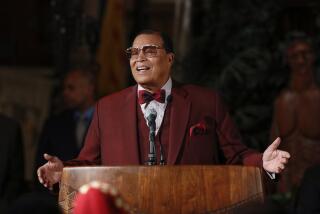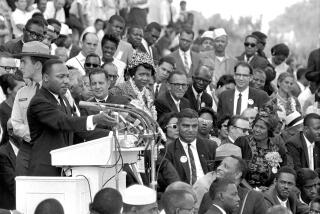On Farrakhan, the Line in the Sand is White : Race relations: Time to consider why the Nation of Islam message resonates with middle-class blacks.
- Share via
“Ministry of Rage,” bleated Time magazine recently of its cover subject, Louis Farrakhan. “Why do so many blacks say he speaks for them?”
Then it assigned a white writer to explain how black people felt. I suppose the magazine missed the irony in that.
White interpretation and construction of the black agenda is precisely why so many black Americans are refusing to submit to the arbitrary moral litmus test thrust upon them by leaders in the Jewish community regarding Farrakhan. Some of us are reluctant to toss the baby out with the bath water. So we applaud Farrakhan’s efforts to make black neighborhoods safer, to persuade young men dangling on the precipice of self-destruction to commit themselves to a communal good, his independence of white approval--and lament the parts of him that are anti-Semitic.
“After all,” points out a prominent black in the publishing industry, “people have been allowed to separate the racist parts of Rush Limbaugh’s message from the non-racist segments and still be Limbaugh devotees without condemnation. Why should it be different with Farrakhan?”
Much public anxiety has focused on the violent potential from Farrakhan’s gilded rhetoric, but the worry seems misplaced. For one thing, as Time correspondent Sylvester Monroe, who is black and has covered Farrakhan for more than a decade, points out, “The Nation of Islam, in its 60-year history, has done no violence to any white person. On a physical level, these guys aren’t dangerous at all, especially when compared with the violence routinely practiced by the Ku Klux Klan or the Aryan Nation.” Or, it could be argued, the radical elements of the Jewish right wing such as Baruch Goldstein, who managed to kill dozens of Palestinians while they prayed and derail the Israeli-Palestinian peace talks, perhaps permanently.
What the editors at Time, the sociopolitical pundits and nearly everyone else who has focused on the issue don’t worry about--and should--is the black person who may be working with or living next to them. The black people who have been thoroughly acculturated to the mainstream, who have been educated in its schools, who have worked their way partly up the ladders of influence (and, occasionally, power) who are so heavily invested in the system that the mere mention of Farrakhan’s name should cause shudders.
These are the people who have been called upon to stand up and prove their Reasonable Negrohood by rejecting Farrakhan out of hand. That many have not bespeaks the tremendous anger in many of the most privileged African Americans.
To the person who works and thrives largely at the sufferance of a system not his own--and who is aware of the possible consequence of challenging the system--Farrakhan’s insistence on defining himself on his own terms, in his own time, is vicariously liberating. Having voluntarily forced themselves into a mold of someone else’s making, these black people nod emphatically when Farrakhan points out the limitations of their influence, the actual extent to which they are not free.
So what, you ask; neither are most white people free. We all have jobs to do, bills to pay, lines to toe. But what white people never experience is the nagging (and often confirmed) suspicion that sometimes we are being asked to toe the line for reasons different than anyone else, reasons having to do with our pigment and history.
Six million in the Holocaust; 13 million in the Middle Passage and slavery. The comparisons fly back and forth, and there is no point in this Olympics of the Oppressed. Why bother to keep score? Blacks and Jews both have suffered. We both have persisted. And now we must begin to engage in some meaningful, perhaps uncomfortable dialogue on what lies beneath the furor over Farrakhan.
For black Americans to begin the dialogue, we must come to the table as equals, not because it was demanded by one side of the other. Slavery is finished, and so is the overseer’s role. To truly repair the fractured relationship that exists in the two communities, black people will have to begin defining themselves, regardless of the consequences. And white people, including Jewish white people, will have to accept that this is our right.
Only then might we discuss what causes some black Americans to embrace Farrakhan despite the general opprobrium heaped on them for doing it. Make no mistake about it: Farrakhan is a creation of American racism. If race were not an ongoing problem, he wouldn’t exist.
More to Read
Sign up for Essential California
The most important California stories and recommendations in your inbox every morning.
You may occasionally receive promotional content from the Los Angeles Times.













